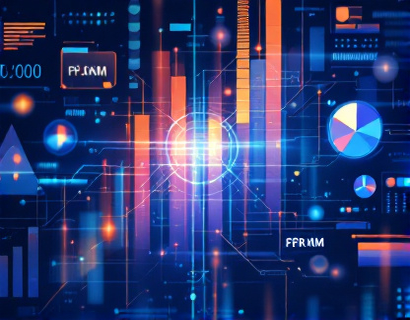Decentralized Identity: Mastering Web3 Domains and Unique Handles for Enhanced Online Presence
In the rapidly evolving digital landscape, establishing a robust and secure online presence has become more crucial than ever. The advent of Web3 technologies introduces innovative solutions for digital identity management, particularly through Web3 domains and personalized online identifiers. This article delves into the benefits of leveraging these tools to enhance your online visibility, connectivity, and overall digital identity. Whether you are a Web3 enthusiast or someone seeking to fortify your online presence, understanding and implementing Web3 domains and unique handles can significantly elevate your digital footprint.
Understanding Decentralized Identity
Decentralized identity, often referred to as DID, is a concept that empowers individuals to own and control their digital identities without relying on centralized authorities. In the traditional web, platforms like social media and email services act as intermediaries, managing and storing user data. This centralization poses risks such as data breaches, loss of control over personal information, and limited portability of identity across different services. Decentralized identity addresses these issues by giving users the keys to their own identity data, stored securely on decentralized networks like blockchain.
The core idea behind DID is to create a system where users can prove their identity and attributes in a verifiable yet private manner. This is achieved through cryptographic techniques and decentralized protocols. Web3 domains and unique handles are integral components of this ecosystem, serving as the digital addresses that represent your identity on the decentralized web.
Web3 Domains: The New Frontier of Online Identity
Web3 domains, also known as decentralized domain names, are a revolutionary alternative to traditional domain names managed by centralized registries. These domains are stored on blockchain networks, ensuring transparency, security, and ownership by the user. Unlike conventional domains, which can be revoked or suspended by central authorities, Web3 domains provide a level of permanence and control that is unparalleled.
One of the primary benefits of Web3 domains is their ability to enhance online visibility. By using a unique and memorable domain name, you can create a professional and recognizable online presence. This is particularly valuable for individuals and businesses looking to establish a strong brand identity in the decentralized web. For instance, a Web3 domain like `yourname.downvable.dev` can serve as a direct and trustworthy link to your digital persona, making it easier for others to find and connect with you.
Security and Ownership
Security is a paramount concern in the digital age, and Web3 domains offer enhanced protection compared to traditional domains. Since these domains are stored on a blockchain, they are less susceptible to censorship and tampering. The decentralized nature ensures that no single entity has control over your domain, reducing the risk of unauthorized access or suspension. Additionally, the use of cryptographic techniques ensures that your domain and associated data remain private and secure.
Another significant advantage is the ownership aspect. With Web3 domains, you truly own your digital address. This means you can transfer your domain to another blockchain or service without losing ownership or facing restrictions imposed by centralized platforms. This level of control is empowering, allowing users to maintain sovereignty over their online identity.
Unique Handles: Personalized Online Identifiers
Complementing Web3 domains, unique handles, often referred to as @ handles, provide a concise and personalized way to represent your identity online. These handles are typically used on decentralized social networks, messaging platforms, and other web3 applications. Unlike usernames that are often generic and easily forgettable, unique handles allow you to create a distinct and memorable online identity.
For example, a unique handle like `@youruniquehandle.dev` can serve as your digital signature, making it easy for others to find and recognize you across different platforms. This is particularly useful in the decentralized social web, where traditional social media platforms are being replaced by more decentralized and user-owned alternatives. A unique handle can help you build a consistent and recognizable presence, fostering stronger connections and interactions.
Enhancing Connectivity and Networking
The use of unique handles significantly enhances your connectivity and networking capabilities in the decentralized web. Decentralized social networks and communication platforms often prioritize privacy and user control, offering features that centralized platforms cannot match. With a unique handle, you can seamlessly integrate into these ecosystems, participating in discussions, sharing content, and building relationships without the constraints of centralized moderation.
Moreover, unique handles can be linked to your Web3 domain, creating a cohesive and professional online presence. This integration allows you to maintain a consistent brand across various digital touchpoints, from your domain to your social handles. It also simplifies the process of sharing your contact information, as you can easily provide your unique handle alongside your Web3 domain, making it straightforward for others to reach out to you.
Practical Steps to Establish a Decentralized Identity
Setting up a decentralized identity involving Web3 domains and unique handles is a straightforward process, even for those with limited technical expertise. Here’s a step-by-step guide to help you get started:
- Choose a Web3 wallet: Select a reliable wallet that supports decentralized identities and blockchain interactions. Popular options include MetaMask, Trust Wallet, and WalletConnect.
- Select a blockchain: Decide which blockchain network you want to use for your Web3 domain and unique handle. Ethereum and Solana are among the most widely supported networks.
- Acquire a Web3 domain: Visit a domain registrar that specializes in Web3 domains, such as Namecoin or Unstoppable Domains. Choose a unique and memorable domain name that reflects your identity.
- Create a unique handle: Register a unique handle on a decentralized social network or platform that supports @ handles. Ensure the handle is concise and easy to remember.
- Link your domain and handle: Many platforms allow you to link your Web3 domain to your unique handle, creating a seamless and professional online presence. Follow the platform’s instructions to complete this step.
- Secure your identity: Use strong passwords and enable two-factor authentication to secure your wallet and accounts. Regularly back up your private keys to ensure you maintain control over your identity.
By following these steps, you can establish a robust and secure decentralized identity that enhances your online presence and connectivity. The process is user-friendly and can be completed in a matter of minutes, opening up a world of possibilities in the decentralized web.
Benefits of Decentralized Identity
The advantages of adopting Web3 domains and unique handles extend beyond just enhanced online visibility and connectivity. Here are some key benefits:
- Control and Sovereignty: You own and control your digital identity, free from the constraints of centralized platforms.
- Security: Decentralized storage and cryptographic techniques provide robust protection against data breaches and unauthorized access.
- Portability: Your identity is portable across different services and platforms, ensuring consistency and ease of use.
- Privacy: Decentralized identity systems often prioritize user privacy, allowing you to share only the information you choose.
- Resilience: Your online presence is resilient to censorship and takedowns, as there is no single point of failure.
These benefits collectively contribute to a more empowering and secure digital experience, making decentralized identity a compelling choice for the modern internet user.
Future of Decentralized Identity
The future of decentralized identity is promising, with ongoing developments and innovations set to enhance the user experience and expand the ecosystem. One area of focus is the interoperability between different blockchain networks, allowing for seamless transitions and a more unified decentralized web. Standardization efforts, such as those led by the W3C Decentralized Identifiers (DID) Working Group, aim to create universal protocols that ensure compatibility and ease of use.
Additionally, the integration of Web3 identities with traditional systems is gaining traction, paving the way for a hybrid web where users can seamlessly transition between decentralized and centralized environments. This hybrid approach can help bridge the gap and make decentralized identity more accessible to a broader audience.
As more organizations and developers adopt Web3 technologies, the tools and platforms for managing decentralized identities will become more user-friendly and diverse. This growth will likely lead to increased adoption and a more vibrant decentralized web, where users have greater control over their digital lives.
Conclusion
In conclusion, Web3 domains and unique handles represent a significant advancement in digital identity management. By leveraging these tools, individuals and businesses can establish a robust, secure, and empowering online presence in the decentralized web. The benefits of enhanced visibility, security, and control make the transition to decentralized identity a worthwhile endeavor. As the technology continues to evolve, the potential for a more decentralized and user-owned internet becomes increasingly tangible. Embrace the power of decentralized identity and take your online presence to the next level.










































